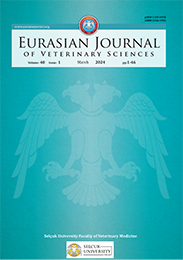| 2005, Cilt 21, Sayı 3-4, Sayfa(lar) 005-014 |
| [ Türkçe Özet ] [ PDF ] [ Benzer Makaleler ] |
| Effect of Offspring Numbers and Different Methods on Estimation of Heritability for Body Weight in Japanese Quail |
| Tamer Çağlayan, Şeref İnal |
| Selçuk Üniversitesi Veteriner Fakültesi, Zootekni Anabilim Dalı, KONYA |
| Keywords: Heritability, Estimation methods, Offspring number, Body weight, Japanese quail |
| Downloaded:1373 - Viewed: 2674 |
|
The purpose of this study is to compare half-sib correlations, parent-offspring correlations, parent-offspring regression and REML methods for estimating heritability for 5-weeks body weight in Japanese quail. In this investigation, 1752 chicks at 5-weeks old were obtained from 21 male and 105 female quail and used as the animal material. Animals were reared at the Veterinary Faculty Farm of Selçuk University, Turkey. After correcting the 5-weeks body weights for sex effect, heritabilities were re-estimated. In addition; 945, 840, 735, 630 and 525 quails were selected from 1752 quails by using sensitive-separation (sampling) method, and heritabilities were estimated for each method. Heritabilities of 5-week body weights from the non-standardized and standardized data sets according to sex factor were estimated between 0.0890.610 and between 0.091-0.590 respectively. Differences between the heritability estimations from the standardized and non-standardized 5-week body weights were not statistically important (P>0.05). Heritabilities estimated by using half-sib correlations method were generally low. However, heritabilities estimated by parent-offspring correlations, parent-offspring regression and REML methods were moderate or high. Estimated heritabilities were increased while offspring numbers were gradually decreased in half-sib correlations, parent-offspring correlations and REML methods. On the other hand, we observed that the number of offspring had no significant effect on heritability estimation in parent-offspring regression method.
|
| [ Türkçe Özet ] [ PDF ] [ Benzer Makaleler ] |




